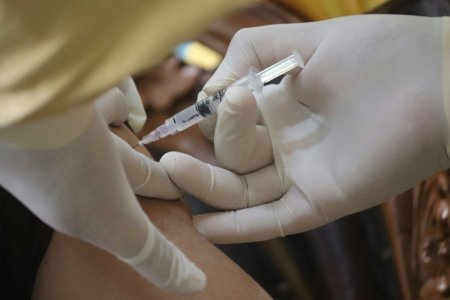Don’t wait, seniors—experts say now is the best time to get your shots
- Replies 0
As we move into another virus season, there’s plenty of confusion around vaccines.
While debates continue about shots for children and pregnant women, experts say there’s no debate for older adults.
If you’re 65 and above, the advice hasn’t changed—you still need your vaccines.
These aren’t just suggestions; they’re lifesaving protection against illness that can quickly turn serious in retirement years.
Georges Benjamin, Executive Director of the American Public Health Association, puts it simply: “There are some preventative therapies that work, and vaccines are one of them.”
For seniors, this means keeping up with flu, COVID-19, pneumonia, RSV, shingles, and tetanus vaccines. Medical guidance has remained consistent over the past five years, even as policies around other groups have shifted. If you haven’t reviewed your vaccine schedule lately, now is the time.
COVID-19 remains a major concern for older Americans. Infectious disease specialist Dr. Vincent Hsu of AdventHealth explains that those 65 and older are especially prone to severe respiratory disease.
That’s why seniors are advised to get two COVID-19 doses along with an annual flu shot. High-dose flu vaccines are available specifically for those over 65, offering stronger protection during the fall and winter.
Experts say flu shots should be given in September or October, right before the season peaks. COVID-19 and flu vaccines are formulated each year to target the latest strains, making it important to get updated doses.
Both mRNA and protein-based COVID-19 vaccines are considered safe, with the choice depending on preference or past side effects. By staying current, seniors can better guard themselves against evolving threats.
But the vaccine checklist doesn’t end there. The CDC also recommends pneumonia shots for older adults, which can help prevent dangerous lung infections.
RSV vaccines are especially important for those with chronic health conditions such as heart or lung disease, and everyone 75 and older is advised to get them. These added layers of protection reduce hospitalizations and serious complications.
Also read: A shot at prevention? Vaccines tied to reduced risk of Alzheimer’s
Shingles is another illness that seniors shouldn’t ignore. “Shingles is a bad disease,” Benjamin warns, noting that it can cause neuropathy and chronic pain if untreated.
Adults over 50 are urged to get two doses, which provide long-lasting protection without the need for boosters. At the same time, tetanus vaccines should not be overlooked, with a dose needed once every 10 years.
Insurance coverage is an important factor for many seniors. According to Dr. Hsu, recommended vaccines are generally covered when the CDC lists them for a specific age group or condition. That means most older adults won’t face extra out-of-pocket costs.
Still, if guidelines change, there’s uncertainty about whether insurers will continue to pay—something doctors hope won’t happen given the proven benefits.
Read next: Could this breakthrough vaccine change the future of this cancer's treatment?

Have you scheduled your vaccines for the season yet? Do you find it easy to keep track of which shots are due, or do you think more reminders are needed for seniors?
While debates continue about shots for children and pregnant women, experts say there’s no debate for older adults.
If you’re 65 and above, the advice hasn’t changed—you still need your vaccines.
These aren’t just suggestions; they’re lifesaving protection against illness that can quickly turn serious in retirement years.
Georges Benjamin, Executive Director of the American Public Health Association, puts it simply: “There are some preventative therapies that work, and vaccines are one of them.”
For seniors, this means keeping up with flu, COVID-19, pneumonia, RSV, shingles, and tetanus vaccines. Medical guidance has remained consistent over the past five years, even as policies around other groups have shifted. If you haven’t reviewed your vaccine schedule lately, now is the time.
COVID-19 remains a major concern for older Americans. Infectious disease specialist Dr. Vincent Hsu of AdventHealth explains that those 65 and older are especially prone to severe respiratory disease.
That’s why seniors are advised to get two COVID-19 doses along with an annual flu shot. High-dose flu vaccines are available specifically for those over 65, offering stronger protection during the fall and winter.
Experts say flu shots should be given in September or October, right before the season peaks. COVID-19 and flu vaccines are formulated each year to target the latest strains, making it important to get updated doses.
Both mRNA and protein-based COVID-19 vaccines are considered safe, with the choice depending on preference or past side effects. By staying current, seniors can better guard themselves against evolving threats.
But the vaccine checklist doesn’t end there. The CDC also recommends pneumonia shots for older adults, which can help prevent dangerous lung infections.
RSV vaccines are especially important for those with chronic health conditions such as heart or lung disease, and everyone 75 and older is advised to get them. These added layers of protection reduce hospitalizations and serious complications.
Also read: A shot at prevention? Vaccines tied to reduced risk of Alzheimer’s
Shingles is another illness that seniors shouldn’t ignore. “Shingles is a bad disease,” Benjamin warns, noting that it can cause neuropathy and chronic pain if untreated.
Adults over 50 are urged to get two doses, which provide long-lasting protection without the need for boosters. At the same time, tetanus vaccines should not be overlooked, with a dose needed once every 10 years.
Insurance coverage is an important factor for many seniors. According to Dr. Hsu, recommended vaccines are generally covered when the CDC lists them for a specific age group or condition. That means most older adults won’t face extra out-of-pocket costs.
Still, if guidelines change, there’s uncertainty about whether insurers will continue to pay—something doctors hope won’t happen given the proven benefits.
Read next: Could this breakthrough vaccine change the future of this cancer's treatment?
Key Takeaways
- Experts stress that seniors 65 and older should stay current with vaccines, including flu, COVID-19, pneumonia, RSV, shingles, and tetanus.
- High-dose flu shots and two doses of COVID-19 vaccines are especially recommended to reduce severe illness.
- Shingles requires two doses after age 50, while tetanus needs a booster every 10 years.
- Most recommended vaccines are covered by insurance, though doctors advise checking with your provider and consulting your primary care doctor before getting new shots.







